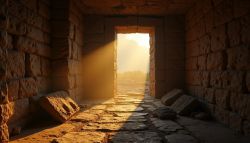Praise be to the God and Father of our Lord Jesus Christ!
In his great mercy he has given us new birth into a living hope through the resurrection of Jesus Christ from the dead, and into an inheritance that can never perish, spoil or fade…
you are receiving the end result of your faith, the salvation of your souls.
I Peter 1:3-4, 9 NIV
Easter was a couple of weeks ago. On the church calendar, we are to be experiencing Eastertide. In essence, this is the period of fifty days leading up to Pentecost during which we are called to revisit the resurrection. I suspect, though, that for many of us Easter was a couple weeks ago and we have moved on from the thrilling services of worship that celebrated Jesus’ resurrection from the dead, re-engaged the regular activities of our lives, and have pretty much left Easter to memories not to be resurrected (pun intended) until Easter 2026. If that is true for you, then perhaps we need to hear the warning Paul gave to the Corinthians: “If Christ has not been raised, our preaching is useless and so is your faith” (1 Corinthians 15:14), because Jesus’ resurrection has not really had any effect for or on you.
Peter reminds us in his first letter that Jesus’ resurrection enables us to experience rebirth into a living hope. Because of Jesus’ resurrection we can, as it were, start living all over again. Whatever our experience before, when we recognize that Jesus’ resurrection enables our resurrection, we can live in a hope that will not ever disappoint us (Romans 5:5). Perhaps Eastertide is intended to help us not set Easter aside, but to help us experience resurrection over and over.
So, what if we celebrated the resurrection not just one day a year remembering the dead body of Jesus coming back to life, but as the ongoing resurrection of all humanity made possible because of Jesus’ resurrection? Is it possible that Easter could be the annual affirmation of our ongoing transformation from death to life, from sin-focused to rightness-focused, from self-focused to other-focused, from loneliness to restored relationships, from violence to peace, from fear to faith, from hostility to love, from a nature of consumption to a nurture of stewardship and generosity?
And, what if our celebration of Easter Day was, as a result, so radical in its meaning that it tempted worldly leaders everywhere to make such celebration illegal, because it represents the ultimate scandal: an annual call for creative and peaceful action challenging the norms that are based on fear, hostility, exclusion, and violence? What if we never stopped making Easter claims about Jesus’ resurrection in AD 33, but also make claims on us today, receiving the result of our resurrection faith asserting that now is the time to be raised from the deadness of fear, hostility, exclusion, and violence to walk in what Paul called “newness of life”? What if Easter was about our ongoing resurrection and so “be for the world the Body of Christ” (Holy Communion liturgy) marked by a generous identity as peacemakers, enemy lovers, offense forgivers, boundary crossers, and movement builders? Just think of how living into the resurrection every day could change the world!
Retired Episcopal bishop and Choctaw citizen Steven Charleston offers this celebratory song for the living hope that results in receiving the end of [our] faith:
Rise up, faithful friends. Wake up, sleepers in the shadows. Wake up to see bright banners on your horizon. Wake up to see your redemption coming to you, the answer to so many of your prayers, the fulfillment of your dream from long ago. Rise up, faithful friends, to shout the good news to the morning sun: justice has arrived at last, mercy has returned, love has won the day. Rise up, good people of many lands, for this is the moment of change, the time when hope starts to be real and truth begins to speak to every courageous heart. Wake up, rise up, and rejoice!*
Imagine the impact of the ongoing recognition that we meet the risen Christ in all we encounter. Would we not constantly celebrate newness, freedom, change, and growth? I imagine it would be like the travelers on the Emmaus Road encountering the risen Jesus appearing in the stranger. And like the strangers we would meet and invite to our tables strangers, aliens, refugees, people of other religions or no religion at all, to welcome them as we would Jesus, and to expect to meet Jesus in them.
So may it be!
With you on the journey,
DS John
*Steven Charleston, Ladder to the Light: An Indigenous Elder’s Meditations on Hope and Courage (Broadleaf, 2021), 154–155.

